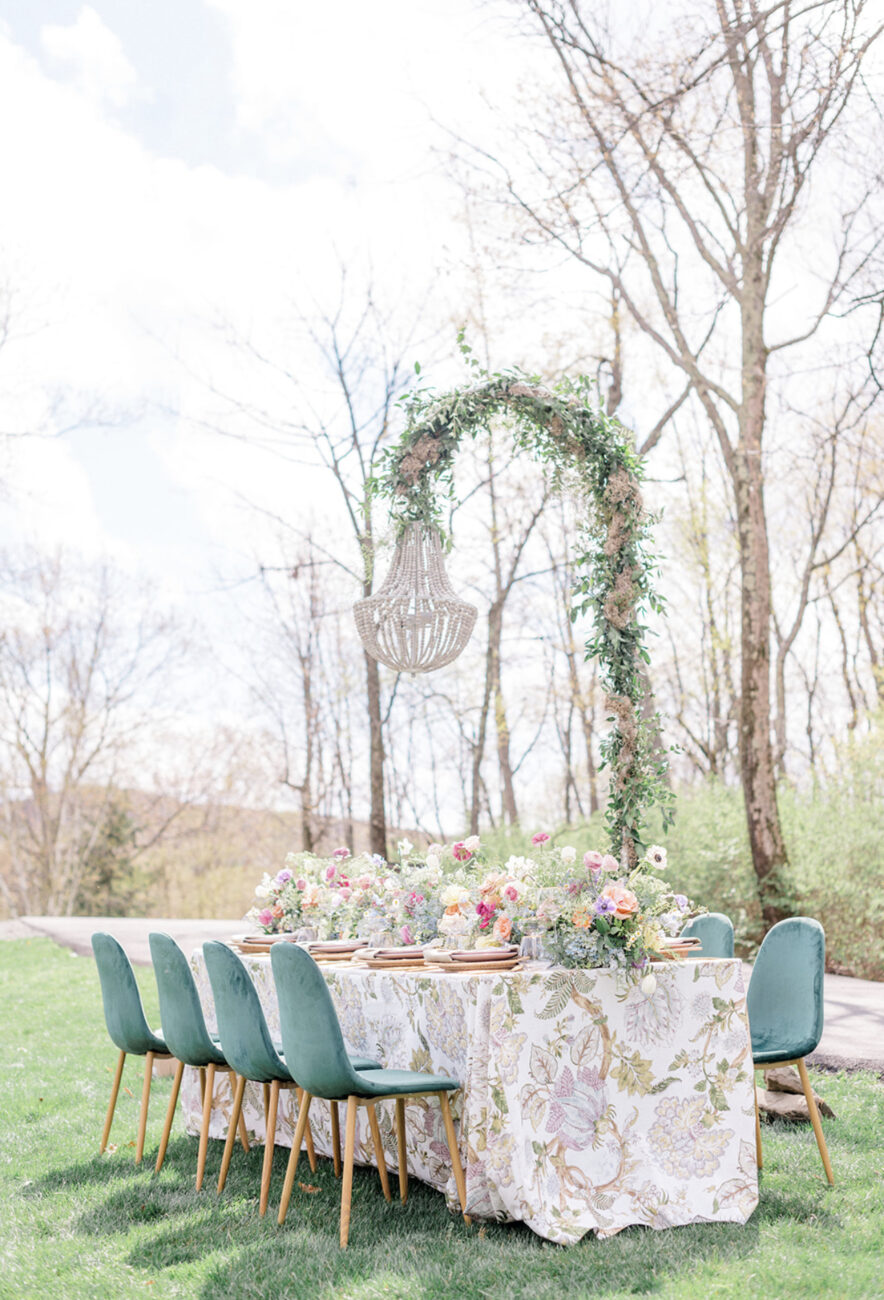Congratulations on your engagement! I am so happy for you!
If you’re thinking “Yay, I’m engaged! Now what?!” — don’t freak out; you’re not the only one.
Planning a wedding is such an exciting time, but it can also be a bit overwhelming, especially when it comes to laying out your financial capabilities.
Wedding expenses can add up quickly, so it’s crucial to have a plan in place to avoid overspending and putting yourself into debt or difficult situations.
After all, your marriage should start off in a place of balance and transparency.
Financial planning can be a tricky topic of conversation, but I’m right here with you to make your wedding day everything you have dreamed of — without feeling like you’re breaking the bank (or like you’re in the dark about what a wedding really costs).
So, let’s talk about the essentials for creating your wedding budget, how much you can expect to pay for your wedding, which elements to prioritize, and how to make your budget feel manageable. 👇
Why You Need To Determine Your Wedding Planning Budget
Your wedding budget sets the foundation for your big day, and is a vital piece of the wedding planning puzzle, because it helps you determine everything about your event, from where you’re getting married, what your decor will look like, which vendors you can afford to work with, how you’ll curate your guests’ experience, and more.
Creating your budget is the part of your planning process where you determine what is within your financial means, and negotiate the touches that could cause you to go beyond your limits.
It’s SO important to remain realistic when it comes to identifying how much you can spend, because you want to be able to actually enjoy your wedding planning process, not spend it sprouting stress-induced pimples, staying up all night calculating how you’re going to pay for your nuptials, or — our personal nightmare — resenting the process altogether and not having FUN planning your wedding.
The first thing you’ll want to do is ask yourself what seems feasible for you and your partner. Think, how much are you willing and able to spend on the wedding?
Take inventory of your current financial situation, including savings, income, and any contributions from family members. Record these numbers in a place you can easily track income and expenses regarding your budget.
Who’s Paying For The Wedding?
If you have contributions from family members and/or loved ones, you’ll want to make sure that you discuss the strings attached to this commitment.
Are you responsible for paying them back?
Are you expected to invite certain family members?
Are they thinking you’re going to involve them in design decisions?
Are they going to be present at planning meetings?
Are they planning on being involved in vendor choices?
It’s always better to be safe than sorry, so don’t assume that a monetary contribution to your wedding fund is coming without expectation. I recommend having a conversation with your generous loved one, communicating your appreciation, and kindly ask their expectation in return.
It’s up to you if you’re okay with the terms of the gift, and you have every right *not* to accept it if you’re uncomfortable with what they’re expecting from you.
Potential conditions aside, you’ll want to have a conversation with anyone paying for certain elements of your wedding either way, especially if they are paying for vendors, because there will be deadlines for payments that they would be responsible for meeting, and you typically give a gratuity to your vendors.
Have a conversation about the terms of accepting money to ensure there aren’t any surprise expectations that will come up along the way.
This is an excellent place to start practicing boundaries. Remember: this is YOUR day and you get to call the shots on the way it plays out.
People are always going to have their opinions, but if they don’t sit right with you and you don’t agree that is okay. You and your partner come first in the world of wedding planning.
To make this process easier for ya, I put together a wedding planner budget spreadsheet. Join the waitlist here — I’ll be launching it very very soon!
Sample Wedding Budget Breakdown: How Much Does A Wedding Really Cost?
All this budget talk probably has you wondering just how much you ACTUALLY need to set aside, right?! Let’s talk about it!
Before I share a sample wedding planning budget with you, I’m gonna be real with you:
Weddings are damn expensive.
Regardless of which venue you book, whether you have a plated vs. family style dinner, whether you choose a DJ or a band, a wedding is a luxury experience. Period.
I know social media often has you believing otherwise — especially when you see posts like the one below from Vogue — but weddings cost a pretty freaking penny.
As a wedding planner, it’s so frustrating to see people on the Internet give such misleading advice about creating your wedding budget, because it gives couples completely unrealistic expectations about what their wedding can look like.
& based on these comments from Vogue’s post, I’m not the only one who feels that way…
When you invite guests to a large-scale event that requires entertainment, staff, food, and an enjoyable experience, you need to have realistic expectations of the associated costs, and really understand that, in the wedding industry, what you pay for is what you get.
Now, that’s not to say that you can’t have an amazing time at your wedding if you have a smaller budget — I simply want to manage your expectations from the jump, so you don’t get your dreams crushed later.
Being realistic about what’s affordable for you is the best way to have a successful, enjoyable wedding planning process (and wedding!) that you’ll remember fondly.
Okay, now that my speech is over, we can jump into the wedding cost breakdown. Yay!
After planning weddings for years now, I know a thing or two about the “average” wedding budget, which I’ll tell you right now is about $60k-$70k.
But what the heck does that ACTUALLY get you?!
(Spoiler alert: I’m about to tell you, using a client’s wedding as an example.)
For a 120 person wedding with a plated dinner, cocktail hour bites, open bar, a wedding cake, a DJ, and a string quartet, this couple spent roughly $65,500 for their event at the Wadsworth Mansion in Middletown, Connecticut.
Here’s how this couple spent their wedding budget:
- Venue: $6,500
- Caterer: $22,000
- Photographer: $6,500
- Videographer: $4,500
- Flowers: $7,000
- Entertainment: $6,000
- Beauty: $2,000
- Transportation: $4,000
- Rentals & Decor: $5,000
- Invitations & Save the Dates: $2,000
Prioritize Your Expenses
Once you decide on the amount you’re comfortable spending on your wedding, the next step is to prioritize your expenses. Decide which aspects of your wedding are most important to you, because you’re going to allocate more funds to those areas.
For example, you could choose to increase your budget for flowers, and choose to save on other areas, such as favors.
Sit down with your partner and prioritize the elements of your wedding that are important to you, which ones are mid-tier, and which elements are not necessary.
(And, of course, depending on whether or not you have someone else footing the bill, you may need to have those same conversations with the loved ones contributing to your wedding costs.)
The 3 Biggest Wedding Expenses
#1 – VENUE
Venues range in cost depending on what’s included, so make sure you ask all the right questions before booking.
#2 – CATERER
Whether or not you’re a foodie, the food and bar eats up (pun intended) a large part of your budget, so it’s important to understand everything included — and, of course, taste the food!
#3 – ENTERTAINMENT
Bands can range between $8k-25k, and you also have to factor in ceremony and cocktail hour music. If budget is a concern, a DJ or DJ/live music hybrid could be a good option for you.
After determining which elements of your wedding are the most important to you, and what you’re planning to spend vs. save on, create a list of vendors needed for the wedding.
From florists to caterers to photographers to entertainment, categorize each by what you need versus what you could maybe cut back on.
Now, I’m going to give you a reality check.
You may hate me for it, but I vowed to be real with you, so…
Increase the amount that you wrote down next to each vendor by 15 to 20 percent. This is now your real budget.
The reality is this: weddings are expensive regardless of how much you attempt to cut corners or save here and there, and things add up QUICK. You’d rather save more than you need, than be left without enough.
If you want a nice wedding, it is important to understand that this requires a decent chunk of change — especially in the New England and New York areas.
Next Up: List ‘Em Out
When creating your wedding budget, lists are going to become your new best friend.
Especially if you’re a visual learner, it is extremely helpful to write everything down in a clear format so you can keep record and track your expenses.
Use a spreadsheet to track your list of vendors that includes a column for the estimated amount and the actual amount.
This will help you keep track of your spending, including deposits, mid payments and final payments. Doing so will help you avoid getting charged with late fees, as well as showing the vendors the respect of making sure they are getting paid on time.
Spreadsheets can be a helpful tool in wedding budget planning in order to anticipate and allocate funds as needed.
Make sure you keep it updated regularly in order to accurately track your expenses and ensure you’re staying within your budget. This visual representation of the expenses can help you stay informed in the decision making process and avoid overspending.
Side note: if you’re looking for the perfect spreadsheet to help you stay organized during the planning process, my wedding planner budget spreadsheet will be launching SO soon!! Click here to join the waitlist & be the first to be notified as soon as it’s available.
Research, Research, Research
Once you have talked about what the big number looks like, including priorities and all that you want your wedding to be — do your research!
Start with your venue, because it’s going to be one of the largest expenses, and you’ll need to be able to secure a date in order to book your other vendors (and see their pricing for the specific size of the event and season).
Starting at your venue will not only lock in your date, but it will provide a forward direction of additional vendors you may need to book and budget for.
The time of year plays a crucial role in the price point of a venue, so you may want to consider an off season date if your heart is set on a venue, but not the price.
A helpful tip: Keep in mind that Fridays and Sundays are less expensive than Saturdays. This is another way to save money if you see your dream venue but can’t afford the premium night.
And, just so you’re aware, you *will* need to book your venue before you can actually reach out to vendors in order to provide a date of service. Without a date, they won’t be able to contract with you.
Choosing your venue first can also potentially cross a few other to-do’s off of your list, if the venue includes food & beverages, seating, etc. You’ll want to make sure ASAP that you know whether or not you need to hire a caterer, book rentals (for tables, chairs, other infrastructure), etc., because if you need to book those things separately, that’s another expense.
Related: 30 Questions To Ask On Your Venue Tour
Once the venue is booked, check back to your priority list to begin booking those vendors. As you’re going down the list, you may realize that some of these vendors are no longer within your budget.
You may have allocated more money for a photographer that you really really love and may now need to decide against favors for your guests. This is totally up to you and based on your preference, the only right way to do it is what feels right to you.
Shopping around will help you get an idea of the average cost in your area. Make sure to look for reviews and testimonials from past clients to get an idea of their quality of service. Don’t hesitate to ask for quotes and compare prices from multiple vendors! After all, you want to make sure you’re getting the best value for your money. However, the least expensive option doesn’t always mean it’s the best!
Take your time when you’re researching — there’s no need to rush into a venue or vendor if something isn’t sitting right with you.
Understand the ins and outs of your budget, and what is available to you within your financial means, so you’re completely aware of what all your money is going to. Contrary to popular belief, you can have your cake and eat it, too, if you’re strategic about it.
And just like that, you’re ready to plan a wedding!
Wedding planning on a budget requires careful consideration and organization. Creating and following your budget is a crucial aspect of the planning process.
By determining your budget, prioritizing expenses, creating a spreadsheet, doing research, annnddd some discipline, you can successfully plan your dream wedding within your budget.
REMINDER: it is okay to splurge on certain aspects of your wedding. Certain elements are going to be more important to you than others.
Keep your long-term financial goals in mind in order to avoid going into debt, and utilize the spreadsheet I mentioned earlier to avoid feeling overwhelmed and unsure about how to manage your finances.
& Because I want nothing more than to make this process as easy and enjoyable as possible for you, I’ve created the perfect easy-to-use wedding planning budget spreadsheet to help you streamline the process!
Join the waitlist to be the first to know when it launches. (Pinky promise, you’ll love it).
Your wedding day is intended to be one of the best days of your life, with your most favorite people in the world celebrating by your side — and with proper planning and budgeting, you can have everything you want…
…without the unnecessary financial stress or burden.
Stay organized, be communicative, and remain adaptable. You can create a wedding that reflects your love story while staying within your budgetary constraints. I promise you that it is possible.
Happy wedding planning!
Hi! I’m Lindsey, Founder, Executive Planner, and Creative Director here at Wildflower Events and Design. Nice to meet you! To learn a little bit more about me and what I do, here are a few ways you can connect with me:
Subscribe to my weekly newsletter — I send a friendly hello, along with exclusive wedding planning, design and coordination tips and info directly to your mailbox every Wednesday! If you want a little midweek check in for ya girl, click here to subscribe.
Check out my services — curious about what a wedding planner can actually do for you? I offer wedding planning, design, and coordination services. And who knows, maybe we’ll happen to become besties along the way.
Inquire here — if you’re thinking that I may be the gal for you as you’re getting to know me and what I do a little bit better, I would love to hear from you & help! Click here to get in touch with me.
Follow me on Instagram — come take a look at some of my favorite events, what life as a wedding planner is really like, and LOTS of behind-the-scenes wedding and wedding planning moments. Can’t wait to see you there ❤️



